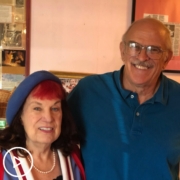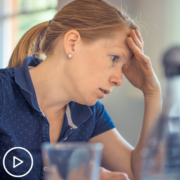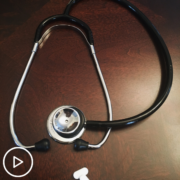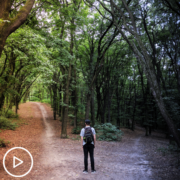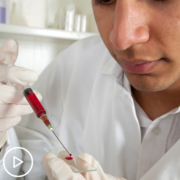An MPN Care Partner Shares Why He’s Optimistic About the Future
An MPN Care Partner Shares Why He’s Optimistic About the Future from Patient Empowerment Network on Vimeo.
Care partner Jeff Bushnell, husband of myelofibrosis (MF) patient advocate Summer Golden, explains why he’s hopeful about their future together. Jeff shares key resources that have helped him stay educated and maintain optimism.
Summer Golden and Jeff Bushnell have been married for over 20 years. When Summer was diagnosed with myelofibrosis (MF), Jeff took on the role of care partner and advocate. Summer uses her years of theatre training and comedy to cope with her condition and help others, while maintaining positivity about the future.
See More From the The Path to MPN Empowerment
Related Programs:
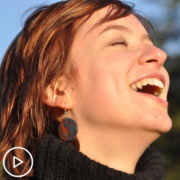
Is Laughter Really the Best Medicine? One Woman’s Mission to Help Others with MPNs |

|
|
Transcript:
Jeff:
It’s important to educate yourself because the more you know the less fear can overcome you. And this particular disease – the research is happening so fast, and things are changing. In my estimation, they’ll find – right now, the only cure is a stem cell transplant. It’s normally not done for older people. That in itself is innately risky. I’m convinced, probably within the next five to seven years, there will be a cure for this disease that’s not a stem cell transplant.
The research is moving that quickly on it. And if you don’t follow the disease and the people that are working on it, the specialists, you’re gonna have a much greater chance of feeling powerless and getting overwhelmed by it. As Summer believes, attitude can have a huge, huge impact on how the course of your disease runs. And a doctor would tell you the same thing.
For me, it started with Patient Power. Patientpower.info, I believe is, what it is. They have a whole section for myeloproliferative neoplasms and myelofibrosis, and they’re short videos. And you get a chance to listen to the best doctors that are the head people in this, Dr. Mesa, Dr. V [Verstovsek], and Dr. Jamieson – all the people that are really the movers and shakers. They speak. And you also get a chance to hear other patient’s stories and how they’re dealing with it. And that will give you a much better idea of what you’re facing. And you can really understand things from there. And you can get your knowledge.
Fear comes from lack of knowledge. In my job as a pilot, I flew for 50 years. I very, very rarely was afraid because my knowledge was so great and was reinforced every year by continual training that I felt prepared to handle anything that might come across to me. Knowledge is really important. It will allay your fears dramatically.
When I started online and heard about people that had been journeying with this for 10 or 15 years, initially, I had thought – well, this is a year or two, and it’ll be the end. And then I realized, plenty of people have lived with this for a long, long time. And they had a journey, and they’re doing it successfully. And that gave me confidence.
The more people you can talk to about it, the more you can put your journey in perspective. And it’s really hard to put in perspective for this particular disease because it affects everybody vastly differently. Some cancers – the progression is very, very linear. Everybody kind of goes through the same thing. This one – it depends on the mutations you have in your blood and all kinds of things like that, and some people get really bad symptoms quickly.
Others, they don’t. But the more you know about how those things affect you, the more you know and can understand about what to expect. And the more people you talk to who have it, you can find out about their journeys. It helps put yours in perspective.
I’m optimistic because I really keep up to date on what’s going on. And I see the doctors that are in the forefront of this and the research that they’re putting in and the care they have for working on this disease and the knowledge they have, and I just am quite optimistic. And as I say, I’m following the medical developments extremely closely.
I went to the ASH Conference last year. And I’ve gone to another conference that our doctor spoke at. And I’m just kinda blown away by – I’m fascinated by the science.
My advice would be find out as much as you can about it and support each other in a way that works in your own marriage.
Summer and I approach life a little bit differently. And yet, one of the reasons we do so well together is we kinda have both ends of the spectrum covered. And I sensed that when I met her 20 years ago. And we brought something to the table that each of us needed. And if you can find that in your relationship with your significant other that has the disease, what you can bring to it, what they can bring to it, you can be a tremendous support for each other.

